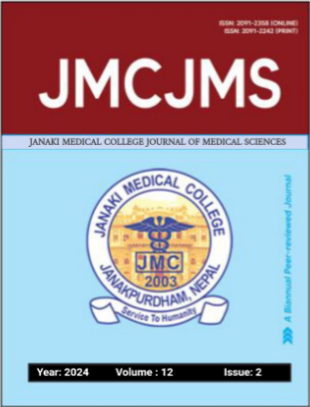Stress-related factors and their correlation among Air Traffic Controllers of Kathmandu, Nepal
DOI:
https://doi.org/10.3126/jmcjms.v12i02.68367Keywords:
Air traffic control, aviation, stressAbstract
Background & Objectives: Air traffic controllers are responsible for smooth flow of aircrafts and their primary responsibilities are to prevent mishaps of aircrafts in air or on the ground. However, due frequent aircraft collision, their job is considered stressful. The objective of the study was to find the prevalence of stress and its associated factors among Nepalese air traffic controllers.
Materials and Methods: A descriptive cross-sectional study was conducted on the air traffic controllers who were stationed in the airport and were routinely engaged in controlling the aircrafts. A total of 63 traffic controllers were recruited for the study using systematic random sampling from Tribhuvan International Airport, Kathmandu from November 2020 to October 2021. Bivariate Analysis was performed to measure the association between socio-demographic characteristics and stress using Pearson’s chi-squared test and t-test.
Results: The study found that 70 percent of air traffic controllers were suffering from stress. This study showed significant association between day and night shift, sleep hours and alcohol with stress (P< 0.05). Moderate stress was found among air traffic controllers with less day shift (12.8 Vs 12.2) and more night shift. Air traffic controllers with sleep deprivation and alcohol consumption were associated with high stress.
Conclusion: Higher prevalence of moderate stress were depicted among air traffic controllers of Kathmandu, Nepal and highlights the need of further extensive research in this area so as to suggest appropriate strategies to reduce stress among professionals working for national aviation industry.
Downloads
Downloads
Published
How to Cite
Issue
Section
License
© JMCJMS, JMC, Janakpur, Nepal




